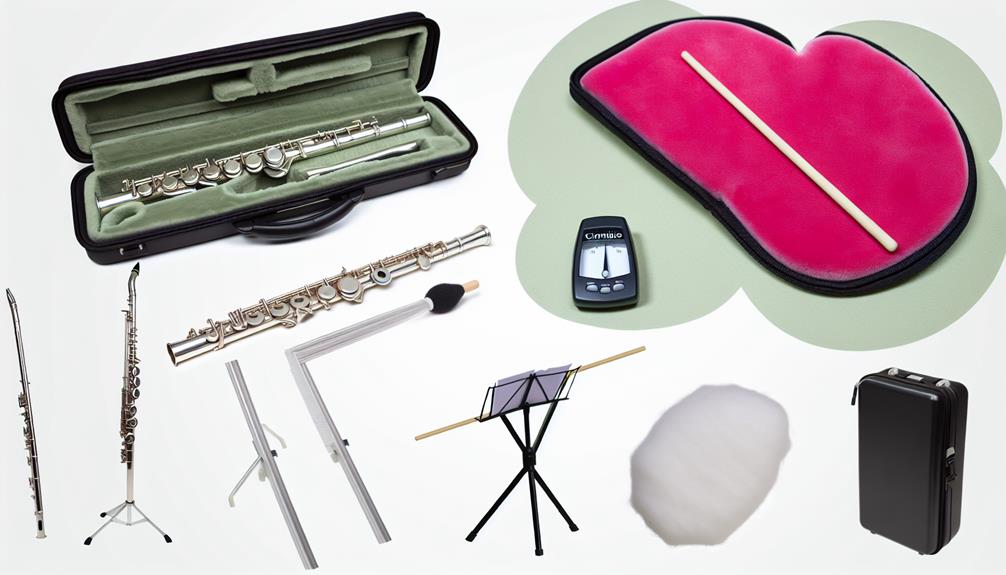Learning flute songs as a beginner can be simple and fun. Start by choosing a comfortable flute, like a nickel model. Focus on essential techniques such as breath control and finger positioning. Get to grips with musical notation, so you can read notes easily. Begin with easy songs like "Twinkle, Twinkle, Little Star" to build confidence and practice slowly. Use online resources for tutorials and exercises, and connect with a music community for support. Track your progress to stay motivated, and explore various song styles to expand your repertoire. Keep going, and you'll uncover even more valuable tips!
Key Takeaways
- Start with simple, recognizable songs like "Twinkle, Twinkle, Little Star" to build confidence and practice basic techniques.
- Focus on mastering breath control and finger positioning for smooth transitions and steady sound production.
- Utilize video tutorials and interactive apps for accessible learning and engaging practice exercises tailored to your skill level.
- Practice slowly and gradually increase speed, ensuring accuracy and consistency in your playing.
- Keep a practice journal to track progress, set goals, and celebrate achievements, enhancing motivation and commitment.
Choosing the Right Flute

Choosing the right flute is essential for your learning experience and overall enjoyment of the instrument. When you're starting, understanding the various flute types and materials can make a significant difference in how you connect with music.
You'll primarily encounter two main flute types: the concert flute and the piccolo. The concert flute, typically made of silver, gold, or even nickel, is the most common choice for beginners. Its rich sound and versatility make it ideal for various music genres.
On the other hand, the piccolo, which is smaller and higher-pitched, can be a great addition once you've gained some experience.
Flute material greatly influences your instrument's tone and playability. Silver flutes offer a warm, rich sound, while nickel flutes are more affordable and durable for beginners. If you're looking for something more luxurious, consider a gold flute, which provides a sweet and resonant tone, though it comes at a higher price point.
As you browse through options, hold different flutes to see which feels comfortable. The weight, balance, and key placement should feel natural in your hands.
Don't hesitate to ask for recommendations from teachers or fellow musicians; they can provide valuable insights into what might work best for you.
Essential Flute Techniques

Once you've selected the right flute, it's time to focus on developing your playing skills. Mastering essential flute techniques will help you express yourself and connect with others through music.
Start with breath control; it's fundamental for producing a steady sound. Practice taking deep, diaphragmatic breaths to support your playing.
Next, pay attention to finger positioning. Proper placement guarantees smooth shifts between notes, making your playing more fluid.
As you practice, work on tone production by experimenting with your embouchure formation. A well-formed embouchure allows for rich, resonant tones.
Intonation techniques are vital, too. Regularly check your pitch by playing alongside a tuner or with other musicians. This will fine-tune your ear and improve your overall sound.
Don't forget about vibrato exercises; they add emotion and depth to your music. Start slowly, focusing on consistent, controlled oscillation.
Articulation methods play a significant role in your sound as well. Experiment with different tonguing techniques—like legato and staccato—to bring variety to your playing.
Finally, sound projection is key in ensemble settings. Work on playing with confidence, projecting your sound without straining.
Understanding Musical Notation
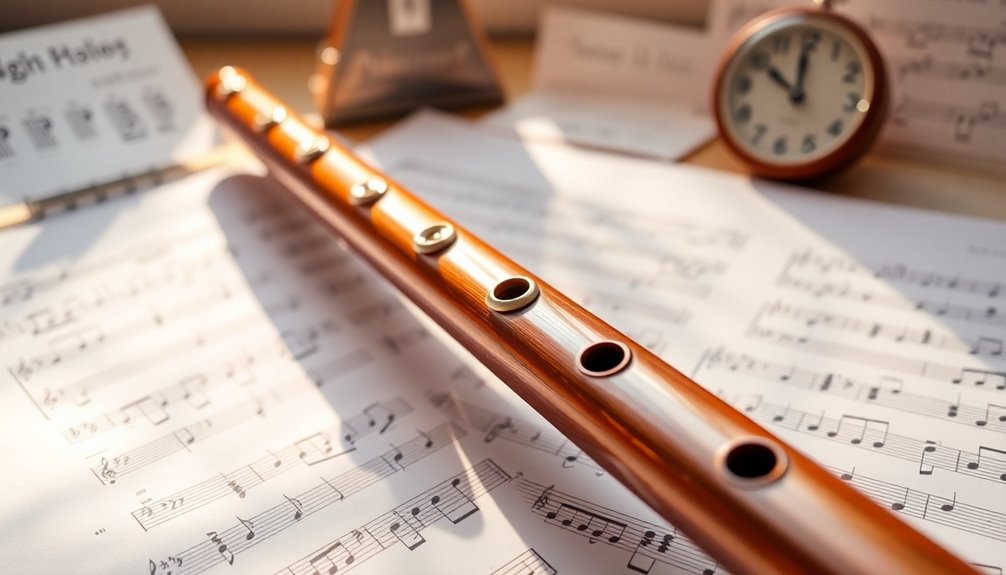
Understanding musical notation is essential for any aspiring flutist. It's the language of music, and by learning it, you'll reveal a world of melodies and rhythms. Notation consists of various elements, including note values, which determine how long each note is held. Familiarizing yourself with staff lines will help you place notes accurately, while clef types indicate the pitch range of the music you're playing.
Here's a quick overview of important notation components:
| Notation Element | Description |
|---|---|
| Note Values | Defines duration of notes, e.g., whole, half, quarter, eighth |
| Staff Lines | Five horizontal lines where notes are placed to indicate pitch |
| Time Signatures | Indicates the number of beats per measure, e.g., 4/4, 3/4 |
| Key Signatures | Shows the key of the piece, indicating sharps or flats |
Understanding dynamics markings will allow you to express your music with varying volumes, while rhythm patterns help you keep a steady tempo. Melodic phrases are the building blocks of your music, guiding you through the song's structure.
Recommended Beginner Songs
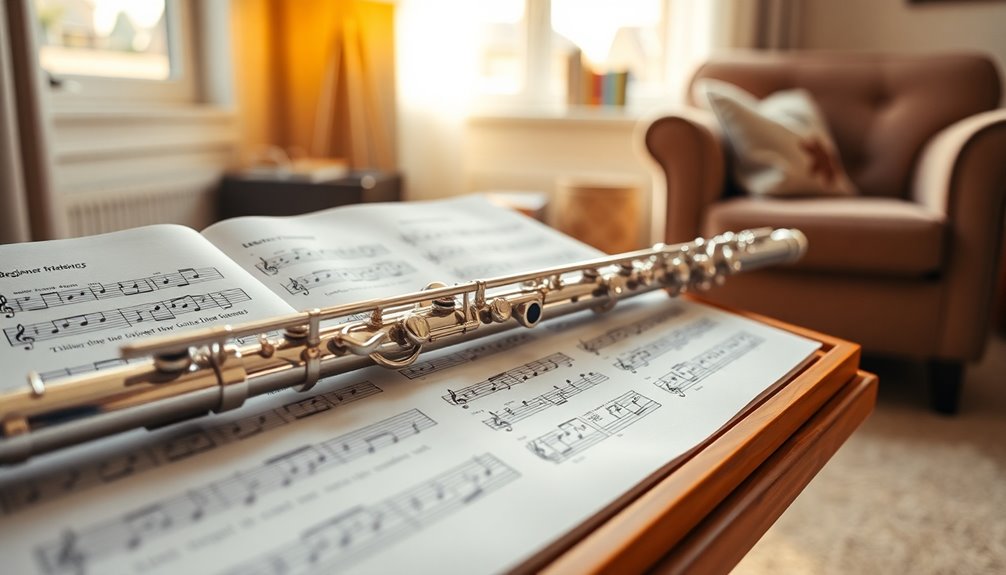
With a solid grasp of musical notation, you're ready to explore some enjoyable songs that will help you practice your flute skills. Starting with popular children's songs can be a fantastic way to build your confidence. Songs like "Twinkle, Twinkle, Little Star" and "Mary Had a Little Lamb" aren't only familiar but also feature simple melodies that are easy to pick up. These tunes allow you to focus on tone and breath control while enjoying the satisfaction of playing something recognizable.
In addition to children's songs, you might want to try your hand at some easy classical pieces. "Ode to Joy" by Beethoven and "Minuet 1" from Bach's Anna Magdalena Notebook are excellent choices. These easy classical pieces provide a wonderful opportunity to practice phrasing and dynamics, helping you develop a more expressive playing style.
As you immerse yourself in these songs, remember to take your time. Practice them slowly at first, ensuring you hit the right notes before increasing your speed.
You'll find that repetition not only solidifies your skills but also gives you a sense of accomplishment.
Online Resources for Learning
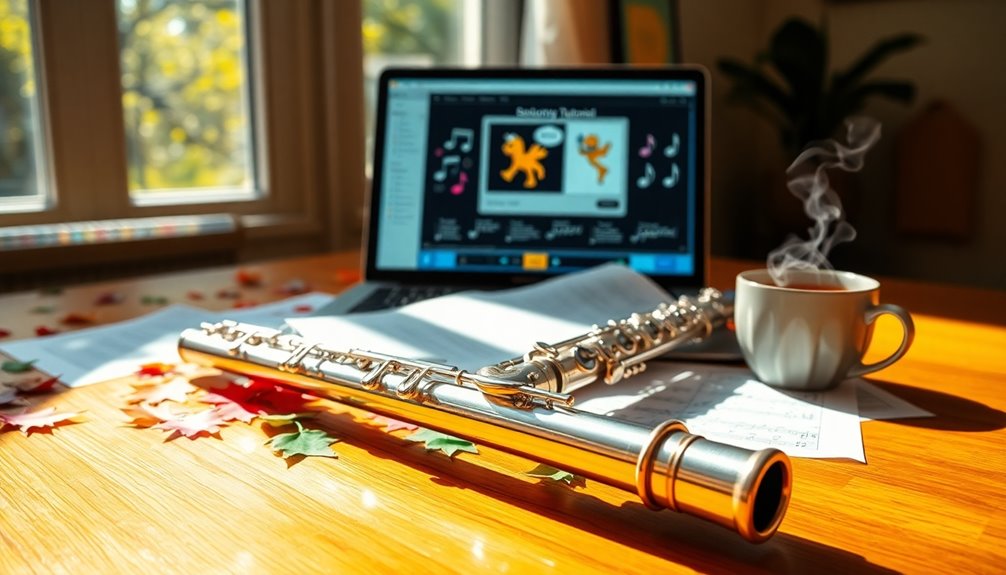
A wealth of online resources is available to help you enhance your flute skills and deepen your understanding of music. Whether you're just starting or looking to refine your technique, these tools can be incredibly beneficial.
Video tutorials are one of the most accessible ways to learn. You can find countless channels dedicated to teaching flute techniques, songs, and tips from experienced flutists. These videos often break down complex pieces into manageable sections, allowing you to follow along at your own pace.
Plus, the visual aspect helps you grasp finger placements and breathing techniques more effectively.
In addition to video tutorials, consider using interactive apps designed for musicians. Many of these apps offer engaging exercises, practice tracks, and even games that make learning fun. You can track your progress, set goals, and even connect with fellow flute players, fostering a sense of community.
Some apps also provide instant feedback on your playing, helping you identify areas for improvement.
Combining these resources allows you to create a personalized learning experience. You can choose specific songs you want to learn or focus on technical skills that challenge you.
Practicing Effectively

To make the most of the online resources available, it's important to practice effectively. Start by setting clear goals for each practice session. Whether you want to learn a new song or improve your technique, having a focused objective helps keep you motivated. Break your practice into manageable chunks, dedicating time to various aspects like scales, song sections, and breathing exercises.
Time management plays a significant role in effective practice. Designate specific times each week for your flute practice, and stick to them as if they were appointments. Consistency helps reinforce your learning and builds a routine that you can rely on. Remember, quality trumps quantity; even 20 minutes of focused practice can be more beneficial than an hour of distracted playing.
Additionally, incorporate a variety of techniques in your sessions. Alternate between playing along with recordings, using online tutorials, and working on sight-reading. This keeps your practice fresh and engaging, allowing you to develop multiple skills simultaneously.
Don't hesitate to record yourself occasionally; it can be eye-opening to hear your progress and identify areas for improvement.
Finally, celebrate your achievements, no matter how small. Reflecting on your growth fosters a sense of belonging in your musical journey. Effective practice isn't just about playing notes; it's about connecting with your instrument and enjoying the process.
Joining a Music Community

Joining a music community can be one of the most rewarding steps you take as a beginner flutist. It's not just about learning to play the flute; it's about connecting with others who share your passion. Whether you're looking for mentorship opportunities or want to participate in collaborative performances, being part of a community can enhance your musical journey considerably.
Here's a quick look at some options you might explore:
| Community Type | Benefits | Examples |
|---|---|---|
| Flute Clubs | Networking, performance opportunities | Local flute ensembles |
| Online Forums | Skill sharing, advice, support | Reddit, Flute Forum |
| Social Media Groups | Community engagement, event notifications | Facebook, Instagram groups |
Consider attending local workshops or music festivals to meet like-minded individuals. These events often offer skill-sharing sessions, where you can learn from more experienced flutists and gain valuable insights. Additionally, online forums provide a platform for asking questions and getting feedback, making it easier to overcome challenges.
Don't underestimate the power of social media groups either. They can lead you to new friends, jam sessions, and even performance opportunities. By engaging with these communities, you'll find encouragement and inspiration to keep playing and improving. So, immerse yourself, make connections, and enjoy the camaraderie that comes with being part of a vibrant music community!
Tips for Staying Motivated
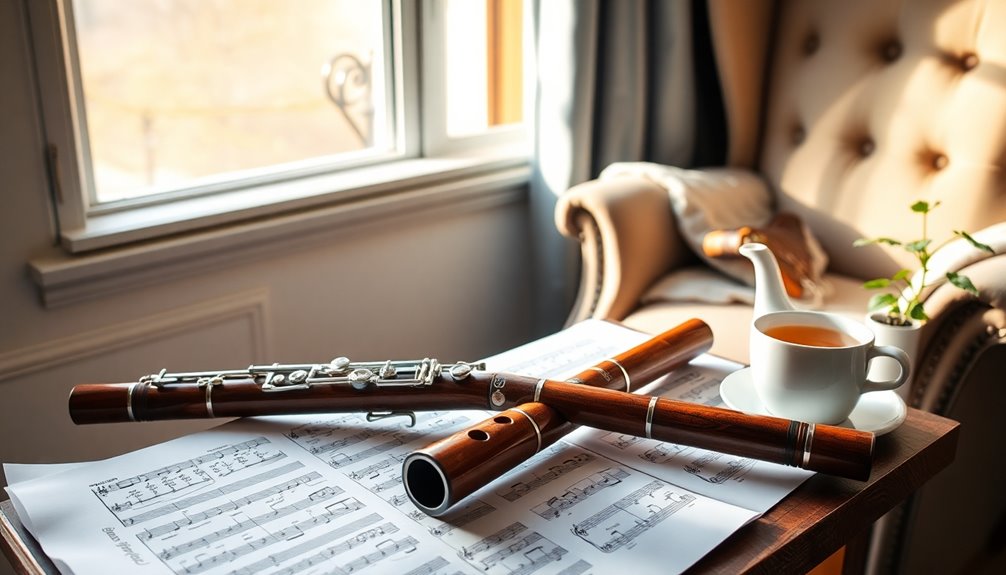
Connecting with fellow musicians can spark your enthusiasm for playing the flute, but it's just as important to maintain that motivation on your own. One effective way to stay motivated is through goal setting. Break down your larger musical aspirations into smaller, achievable goals. For instance, aim to master a simple song or improve your technique within a specific timeframe. This approach not only keeps you focused but also provides a sense of accomplishment as you reach each milestone.
Incorporating positive reinforcement into your practice routine is another powerful strategy. Celebrate your achievements, no matter how small they may seem. If you nail a tricky passage, reward yourself with something you enjoy, whether it's a favorite snack or some downtime to relax. This association between success and reward reinforces your motivation to keep pushing forward.
Don't forget to keep your practice sessions enjoyable! Experiment with different songs and styles that excite you, and allow yourself to explore new musical territories. When you enjoy what you're playing, it's easier to stay committed.
Lastly, remember that motivation can ebb and flow. It's okay to have off days. When that happens, revisit your goals and remind yourself of your passion for music. Surround yourself with supportive friends or fellow musicians who understand your journey. Their encouragement can be the boost you need to keep going.
Stay committed, celebrate your journey, and let your love for the flute guide you!
Recording Your Progress
Recording your progress can be a game-changer in your flute journey. When you take the time to document your improvements, it not only boosts your motivation but also helps you recognize how far you've come. Start by setting clear goals for yourself. Decide what songs or techniques you want to master within a specific timeframe. This way, you're not just practicing aimlessly; you're working toward something tangible.
Next, embrace progress tracking. You can keep a simple journal where you jot down your daily practices, noting what you worked on and how you felt about it. Alternatively, consider recording audio or video of your playing. Listening to your recordings lets you hear the nuances you mightn't catch in the moment, and seeing yourself perform can provide valuable insights into your technique.
As you review your progress, don't forget to celebrate your achievements, no matter how small. Did you finally nail that tricky passage? Awesome! Take a moment to appreciate your hard work. This sense of accomplishment fosters a sense of belonging in your musical community, encouraging you to keep pushing forward.
Expanding Your Song Repertoire

Expanding your song repertoire is essential for becoming a well-rounded flute player. By diversifying your song selection, you'll enhance your skills and find joy in various musical styles. Start by exploring different genres—classical, jazz, folk, and pop. Each genre offers unique challenges for finger positioning, rhythm exercises, and melody practice.
Consider the following table to guide your exploration:
| Genre | Skills Developed | Collaboration Opportunities |
|---|---|---|
| Classical | Finger precision, song analysis | Playing in ensembles |
| Jazz | Improvisation techniques, ear training | Jamming with fellow musicians |
| Folk/Pop | Rhythm exercises, performance skills | Community events, open mics |
As you engage in genre exploration, focus on song analysis. Break down your chosen pieces to understand their structure and elements. This not only aids in ear training but also strengthens your performance skills. Practicing different melodies will help you develop a versatile sound.
Don't forget to connect with others! Collaborating with fellow musicians can provide valuable feedback and inspire new ideas. Invite friends or join local groups to share your passion and learn from each other.
Frequently Asked Questions
How Long Does It Take to Learn Basic Flute Songs?
Learning basic flute songs can take anywhere from a few weeks to a couple of months, depending on your practice techniques and song selection.
If you choose songs that match your skill level, you'll find it easier to progress. Regular practice, even just 15-30 minutes a day, can make a significant difference.
Stay consistent, and don't hesitate to reach out to others for support; you'll feel a sense of belonging in no time!
Can I Learn Flute Without Prior Music Experience?
Absolutely, you can learn flute without prior music experience! Many resources are available that cater to beginners, making it easy for you to start.
Use online tutorials or apps to guide your practice techniques. Focus on simple exercises and gradually build your skills.
Don't worry if you feel lost at first; the journey is part of the fun. With dedication and the right resources, you'll find yourself playing beautiful melodies in no time!
What Are Common Mistakes Beginners Make With the Flute?
You might be surprised at how many beginners stumble with the flute. One common mistake is poor embouchure; if your lips aren't positioned correctly, sound production suffers.
Equally vital is breath control; beginners often blow too hard or too soft, leading to unstable notes.
Don't let these pitfalls discourage you! With practice and awareness, you can overcome these challenges and develop a beautiful tone that resonates with your passion for music.
Is It Necessary to Take Flute Lessons?
Taking flute lessons isn't strictly necessary, but it offers significant benefits.
In-person or online flute resources can guide you, providing structured learning and personalized feedback. You'll develop proper techniques and avoid common mistakes that often hinder progress.
Lessons also keep you motivated and connected to a community of fellow learners. If you're serious about improving, consider investing in lessons to enhance your skills and enjoy playing even more.
How Should I Maintain My Flute Instrument?
Isn't it amazing how a little care can extend your flute's life?
To maintain your instrument, start with regular flute cleaning techniques. After each use, wipe down the exterior with a soft cloth and guarantee the pads are dry.
For deeper cleaning, consider using a cleaning rod and cloth. Additionally, you should check for any signs of wear and follow flute maintenance tips, like servicing it annually.
Your flute deserves the best!
Conclusion
In your journey to master the flute, embrace the thrill of choosing the right instrument, practice essential techniques, and immerse yourself in the world of musical notation. Discover beginner songs that inspire you, explore online resources, and connect with a music community to share your passion. Stay motivated by recording your progress and expanding your song repertoire. With dedication and joy, you'll not only learn to play but also create beautiful music that resonates with your spirit.



